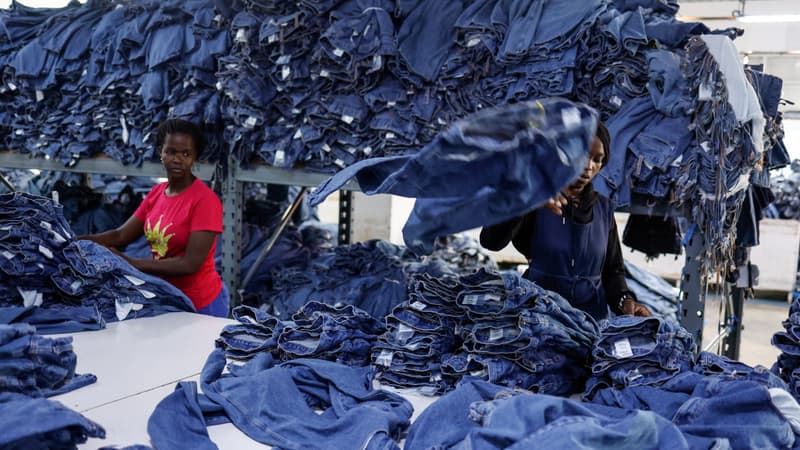In the absence of renewal of an agreement that offers preferential export conditions to many African countries to the United States, a thousand employees of a company manufacture jeans in Kenya will be quickly fired, their employer deplored on Friday.
The AGAA (Law of Growth and African Opportunities), a pillar of commercial relations between Washington and the African continent, allows us to export certain products “made in Africa” to the United States without customs duties. It benefits the thirty sub -Saharan countries, which have exported to the United States for $ 8 billion (6.8 billion euros) in 2024, the main beneficiary is South Africa ($ 3.8 billion), ahead of Kenya ($ 567 million), according to figures from the United States Congress.
Promulgated in 2000, ago would be renewed in September. But many have been wondering for months about their destination, after the agitation of the commercial policy initiated by US President Donald Trump from his return to the White House.
“No one took off our cause”
In the meetings in New York (United States) this week, African managers and executives have received an insurance from the Trump administration administration that Agaa would be renewed, one of the participants, Pankaj Bedi, PDG of United Aryan, a company based in Kenya and Levi exported to the United States to the AFP.
“Everyone we met on the American side believe that yes, Agaa should continue,” he said. But “no one has taken control of our cause (…) Everyone essentially expect a sign of the White House.” Now there is no possibility that this sign occurs before the expiration of the agreement on September 30, Pankaj Bedi continued.
Especially because Donald Trump is not a follower of large -scale free trade agreements that have imposed large taxes to many countries, including African. The White House is also involved in a budgetary confrontation with the American democratic opposition, the threatening president to dismiss public officials if Congress did not vote a financial law by the end of the month. Ause, in this context, it does not seem a priority.
“Very serious consequences”
Agaa could still be renewed retroactively in November, perhaps for two years, to allow a transition to the bilateral agreements that Donald Trump prefers, says Pankaj Bedi. But it can be too late for some buyers, who, in textiles, could, according to him, resort to Bangladesh or Vietnam, giants in the sector.
Therefore, Aryan will say goodbye to 1,000 of its 10,000 employees, resulting in “very serious consequences” for thousands of families that depend on it, laments Pankaj Bedi. The repercussions promise to be important for the entire economy of Kenya because “uncertainty not only concerns buyers, but also lenders, banks,” he lists. “Everyone is very nervous.”
Some African countries have already suffered a massive interruption of their trade due to previous decisions of the Trump administration. The little African kingdom of Lesotho, that the US president had described as “a country that no one has heard”, was one of the most affected after Washington imposed 50% of additional customs duties this year. He also exports clothes to the United States.
Kenya had obtained the lowest customs tasks on the continent with 10%, but with the expiration of the Auga, they should increase to 33%. South Africa, in the midst of a diplomatic blur with Washington, also faces thousands of job losses with the end of Agaa and 30% of customs duties that reach their automotive and agricultural sectors.
The United States had made “a concession” to African states on behalf of their “soft power”, that is, they benefited in exchange for the benevolence of the beneficiary countries, Ghanaian President John Mahama summed up last week. “But President Trump has a more transactional mental state,” he said, judging that customs duties for African countries are already higher, ago is “technically dead.”
Source: BFM TV


